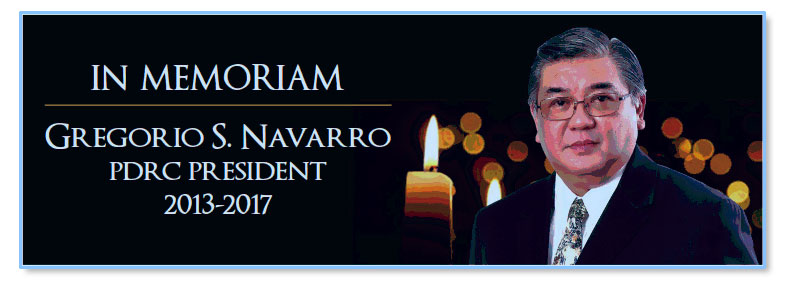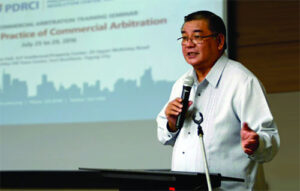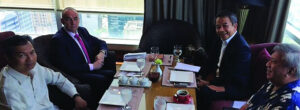
PDRC President Gregorio “Greg” S. Navarro passed away on June 16, 2017 after suffering a cardiac arrest. He was 60.
Mr. Navarro was recently appointed Chairman of Deloitte Philippines/Navarro Amper & Co., after serving as its managing partner and CEO for the past three years. He was concurrently President of Deloitte Philippines Outreach, Inc.
He was a member of the Board of Visitors of the Philippine Military Academy, a member of the Board of Investment (BOI) Multi-Sector Governance Consultative Group, and a fellow of both the Institute of Corporate Directors (ICD) and the Institute for Solidarity in Asia (ISA), which he also served as trustee. He was a trustee of the CIBI Foundation and a member of the Curriculum Advisory Board of the Centro Escolar University School of Accountancy and Management (CEU-SAM).
As PDRC President, Greg was an inspiring and natural leader – smart, decisive, energetic and quick to respond to queries and requests of his team. Through his efforts, first as treasurer and eventually as President in 2013, PDRC set up a development fund to finance the construction of the PDRC office at the PCCI Building in Taguig City. The development fund now supports the operations of the PDRC Secretariat and for the coming years.
At the necrological service in his honor, a friend spoke of Greg as “not only a man with high IQ but also with high EQ.” Indeed, his mentorship and guidance inspired the PDRC Secretariat to give its best, as his kindness and generosity also helped improved the lives of the PDRC staff. His fellow trustees and officers will miss his friendship, humor, as well as sharp and incisive comments on burning issues of the day.
Mr. Navarro received his accounting degree from the University of the East. He obtained the second highest overall rating in the certified public accountancy licensure examinations in October 1976. In 1992, he participated in the Ernst & Young Partner Development Program at the Kellogg School of Management, Northwestern University in the United States. He also completed the Senior Executive Program of the Columbia Business School in New York in 2003.
He was a former member of the Philippine Financial Reporting Standards Council and previously the President of The Carl Jung Circle Center Inc., where he served as a board member. He was also the 2014 President of the Management Association of the Philippines (MAP).
Mr. Navarro was the Vice-chairman of the Integrity Initiative Inc. in 2014-15, and also served in the 2014 Advisory Council of the Philippine Disaster Recovery Foundation, Inc. He was the 2010 President of the Financial Executives Institute of the Philippines (FINEX), 2011 Chairman of the FINEX Research & Development Foundation, Past President of the Rotary Club of Makati Salcedo and the former managing partner and CEO of the audit firm of Punongbayan & Araullo. Before that, he was with SGV & Co., where he began his career. He had 40 years of experience in accounting, auditing, management consulting, and corporate finance.
 While Greg was with us, he received the Young PICPA Achiever Award from the Philippine Institute of CPAs (PICPA) and an outstanding alumnus award from his alma mater, the University of the East, as well as the 2010 Lifetime Achievement Award from the Association of CPAs in Public Practice (ACPAPP). He was a resource person on good corporate governance and applied ethics. He spoke in various schools and universities, private companies, and institutions, including the Corporate Governance Institute of the Philippines, Capital Markets Institute of the Philippines, League of Corporate Foundations, ICD, ISA, MAP, FINEX, PICPA, ACPAPP, PCDEB, and many other professional and business groups. His good governance advocacies included assisting a number of criminal justice colleges in training and developing case studies in ethics and good governance for FINEX.
While Greg was with us, he received the Young PICPA Achiever Award from the Philippine Institute of CPAs (PICPA) and an outstanding alumnus award from his alma mater, the University of the East, as well as the 2010 Lifetime Achievement Award from the Association of CPAs in Public Practice (ACPAPP). He was a resource person on good corporate governance and applied ethics. He spoke in various schools and universities, private companies, and institutions, including the Corporate Governance Institute of the Philippines, Capital Markets Institute of the Philippines, League of Corporate Foundations, ICD, ISA, MAP, FINEX, PICPA, ACPAPP, PCDEB, and many other professional and business groups. His good governance advocacies included assisting a number of criminal justice colleges in training and developing case studies in ethics and good governance for FINEX.
Among his many accomplishments in life were his being a founding director of the Capital Markets Institute of the Philippines and A Life for Others Foundation. He was a past member of the Philippine Chamber of Commerce and Industry (PCCI), Information Technology and Business Process Association of the Philippines (IBPAP), Philippine Business for Social Progress (PBSP), PhilippinesKorea Business Council, The Makati Business Club, the Canadian Chamber of Commerce, the Philippines-Canada Business Council, the Philippines-Japan Economic Cooperation Council, and the Philippines-USA Business Council. Godspeed President Greg!
Coffee with Prof. Alexander J. Bĕlohlávek
 Prof. Alexander J. Bĕlohlávek, immediate past President of the World Jurist Association (WJA) from 2011 to 2015, recently met with PDRC Secretary General Roberto N. Dio and Deputy Secretary General Francisco D. Pabilla, Jr. on May 19, 2017. The meeting was arranged by PDRC Trustee Ricardo P.G. Ongkiko.
Prof. Alexander J. Bĕlohlávek, immediate past President of the World Jurist Association (WJA) from 2011 to 2015, recently met with PDRC Secretary General Roberto N. Dio and Deputy Secretary General Francisco D. Pabilla, Jr. on May 19, 2017. The meeting was arranged by PDRC Trustee Ricardo P.G. Ongkiko.
Prof. Bĕlohlávek was in Manila to explore the possibility of the Philippines hosting the WJA Congress again. He first visited Manila in the late 1980s to attend the WJA Congress.
A Czech by birth, Prof. Bĕlohlávek is a lawyer, a legal educator and a prolific author of several treatises on arbitration. He is also an active arbitrator accredited by several arbitration institutions and organizations around the world. He has more than 400 published works so far.
Because of Prof. Bĕlohlávek’s stature, the meeting turned from a lively discussion into an interview. Professor Bĕlohlávek was generous enough to agree and share his experience and expertise in arbitration.
Given your involvement in several institutions, in the academe, your membership in several arbitration institutions and the WJA, I can imagine that you do not have time for your practice anymore.
ALB: Yes. Actually, I do a lot of things from a distance. I am the decision-maker relative to my schedules, particularly in scheduling hearings and conferences with the parties. I participate in a lot of meetings because of my membership in the International Chamber of Commerce (ICC) International Court of Arbitration (ICA) and other international organizations. When I do arbitrations, I do not have proxies.
“Generally speaking, each individual jurisdiction has adopted its own approach concerning the rules on the determination of the governing law applicable in proceedings in international
matters. In the international practice, arbitral panels usually distinguish four relatively autonomous areas associated with the determination of the applicable law.”
How can one make a good arbitrator?
ALB: A good arbitrator is one who always makes himself available whenever his presence is required during the arbitration process. Of course, he must also maintain his neutrality and independence at all times.
How do you manage to handle your varied responsibilities since you said you now have 20 ongoing arbitration cases?
ALB: I have a fixed schedule. I stick to it and see to it that the deadlines do not cross each other. All my files are saved electronically so I can carry them wherever I go.
What is one of the more important roles of an arbitral institution?
ALB: An arbitral institution must ensure that its arbitrators are always available and impartial. To be able to do this, it must institute a confirmation process in their rules.
What is the ideal number of cases that an arbitrator may handle at any time?
ALB: Very hard to answer. In the Czech Republic we expect that some 130 to 150 thousand arbitral awards will be rendered in 2016. It really depends on the nature of the cases, i.e., I can handle a lot of small/simple cases, maybe two medium cases, maybe one big case. We do not have file counsel or secretary of the tribunal.
When I co-arbitrate, I do everything.
In cases where you do not agree with the award, what do you do?
ALB: I have never drafted a dissent. I just do not sign the arbitral award. I just put there “Declined to sign the award,” without any explanation.
How are awards enforced in the Czech Republic?
ALB: The awards are enforced by the private sector and guaranteed by the State, i.e., the courts.
Are the Czechs more inclined to do arbitration rather than file a case in court?
ALB: Yes, they are more inclined to do arbitration because the courts are extremely formal. And the fees in arbitration are much lower than in the courts. Moreover, in the courts you need translators who are very expensive, while in arbitration you may use any language agreed by the parties.
In your case, how many languages do you speak?
ALB: I can speak German and Czech fluently because they are my native languages. However, in my daily conversations I use Russian, English and Polish. I have sufficient knowledge of the Ukrainian language, French and Dutch; I tried to learn Icelandic and Spanish. I can read French because the ICC ICA is based in Paris, where I used go every month. The number of arbitration cases arbitrated in English is growing, while in the 60s and 70s all arbitrations were conducted in French.
In PDRCI, we do not have scrutiny of the final awards. You are probably used to scrutiny by the ICC. What do you think of that, does that really help the process?
ALB: Actually, I am quite sure it helps … if the ICC can find mistakes, it helps.
You do not feel like the ICC is interfering in the award?
ALB: I was a member of the ICC since 10 years ago. I do not think it has interfered in the award.
Is the arbitration law in Czech Republic an old law?
ALB: No. The current law was formulated in 1994, but the original law was in 1948.
We are impressed with your credentials. Much of your arbitration experiences were in Europe?
ALB: Not all of it are in Europe actually. I have done three arbitrations in Asia but I cannot provide you the details because of the principle of confidentiality.
Since you have been reading about arbitration in the Philippines, how do you think we can measure up with the kind of arbitration that you have in Czech Republic?
ALB: Actually, I am glad that you have an English version of your arbitration laws and rules. I am a co-organizer of a large organization planning to do a large arbitration conference of the ICC in Iceland in September this year. I am now inviting your organization to please attend this conference.
